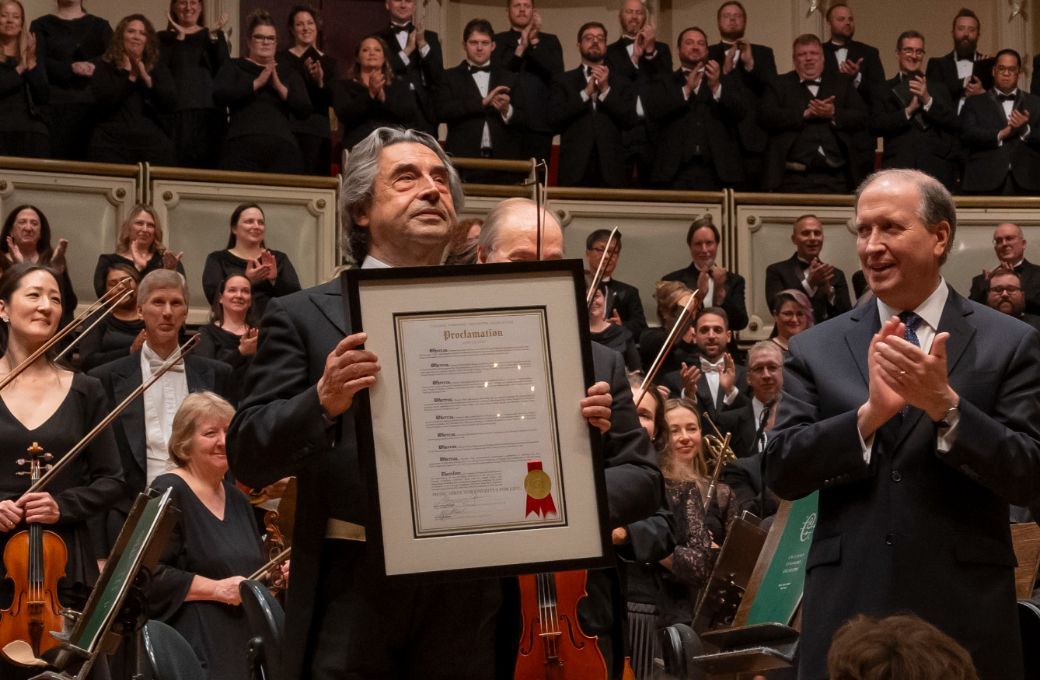I remember fondly Riccardo Muti’s first performance as music director of the Chicago Symphony Orchestra: a free, outdoor “Concert for Chicago” in Millennium Park which attracted an audience of over 20,000. I’ll never forget that collective feeling of civic pride, admiration for the orchestra, and excitement for all that’s to come. Thirteen years later, and that chapter has come to a close with last weekend marking Muti’s final appearances in his capacity of Music Director, an occasion for which he selected Beethoven’s incomparable, transcendent Missa solemnis.
The program notes rightly called the Missa solemnis a work “more admired than loved”. Though a crowning achievement of Beethoven’s last years and arguably his single most ambitious work, its sheer scale and complexity have kept both performers and audiences alike at a distance – the CSO hasn’t touched this score in over a decade. Muti himself had long felt daunted by the piece, only first conducting it as recently as 2021 with the Vienna Philharmonic. Many of Muti’s most memorable performances have been those with the Chorus, and these were no exception, very finely prepared by guest director Donald Palumbo, coming to Chicago from the Metropolitan Opera.
The Kyrie opened in resplendent D major, and Orchestra Hall resounded as a cathedral in the radiance of chorus and orchestra. Muti took matters dignified and solemn with an unwavering seriousness of purpose, often barely needing to move to communicate exactly what he wanted, a sign of the deep musical bond he has forged with these musicians over the years. Beginning brassy and exhilarant, the Gloria evidenced the composer’s grand scale and novel form. The contrapuntal intricacy ramped up to thrilling effect, given with clarity and textural transparency.
Declarative and impassioned, the Credo’s daunting complexity was mastered with a natural fluency. Dynamic contrasts were sharp and dramatic, and quite touching was Stefán Ragnar Höskuldsson's limpid and poignant flute solo, meant to represent the Holy Spirit. “Et resurrexit” burst forth ecstatically, and the phrasing of the long choral lines was shaped with detailed nuance. Tenor Giovanni Sala was quite powerful here, though the collective of soloists proved stellar across the board, a cast that also included soprano Erin Morley, mezzo Alisa Kolosova, and bass-baritone Kyle Ketelsen. Whether intricate melismas, declarative solo passages, or blending together as an ensemble, this quartet handled the score’s challenges with aplomb.
In contrast to the exultant, the Sanctus began darker and rather introspective with some especially lovely playing from the brass, though the pensive and pious gave way as more jubilant material took over. In the orchestral interlude that ingeniously links the Benedictus, an extended passage from concertmaster Robert Chen was fluttering and delicate, a gorgeous, heavenward melodic line. Ketelsen’s stentorian solo gave the Agnus Dei weighty beginnings. The plaintive cries of “miserere” were quite chilling, and the organ added a further layer of richness to this lavish tapestry. The final moments pointed relentlessly upward, perhaps a bit understated given the scope, but as resplendent as anything – one simply could not leave the hall feeling deeply moved.

Apart from the high-level of music making, the evening was very much down to business – until the end, when CSO president Jeff Alexander took to the stage to bestow upon Muti the title Music Director Emeritus for Life. Muti responded with his characteristic blend of humor and sincerity, acknowledging his gratitude to the musicians on stage. Without a successor named yet, Muti is on tap to conduct the orchestra several weeks next season, both at home and on tour. Moreover, it was noted that Muti made 27 appointments during his tenure, leaving an indelible mark that will shape the Chicago Symphony Orchestra for years to come.


